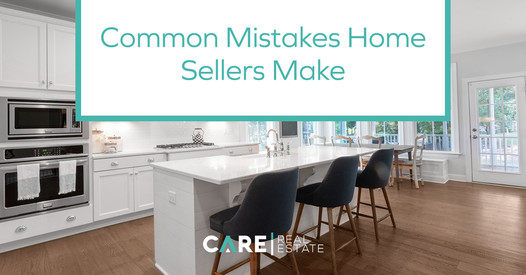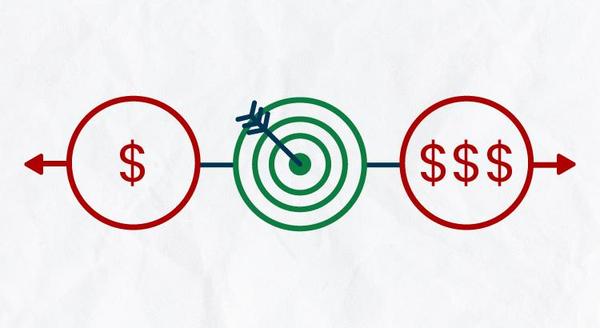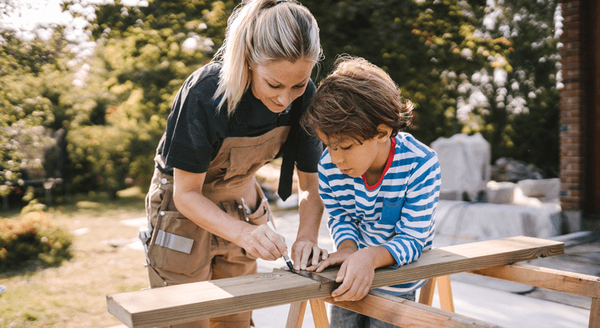
Is It Time to Sell Your Home? Here Are The Signs It Might Be
Unless you’ve been living under a rock, you’ve probably heard about the seller’s market currently taking place around the globe. Seeing what homes are selling for in your neighborhood may have you wondering, “should I sell my home, too?” In this post, we’ll go over the top signs that it may be time for you to get your very own “For Sale” sign. #1. Your Home Is No Longer Meeting Your Needs Outgrowing your home is very common — especially for first-time buyers who outgrow their “starter homes.” As your family grows, it makes sense that a house you bought just for your partner and you starts to feel a little too snug for comfort. Once your family starts growing, or your needs change, there’s a good chance you’ll want to sell and find a new home. Of course, you should have a plan in place before listing your home as far as when the right time to list is (don’t forget to take school, work, and extracurricular schedules into account). Here are some other things to think about: How much other houses in your area are going for. If the neighborhood you’re thinking of moving to is a good fit for your family and needs. If the size of your new house will be able to fit the whole family and even grow with you. On the other end of the spectrum, as people age and their kids fly the nest, they often choose to downsize to something easier to maintain. No matter your situation, if your home is no longer meeting your needs, it’s probably a good idea to sell it. #2. Your Home’s Upkeep Is Taking a Toll If your to-do list is never-ending and unexpected repairs pop up by the day, it might be time for a house that requires less maintenance and upkeep. Did you know the average homeowner pays $2,000 per year to maintain their home? That includes landscaping, snow removal, trash and recycling, gardening, house cleaning, septic services, and so on. That doesn’t even cover what it costs to make repairs. These costs on top of property tax and the mortgage can start to add up — surprising some first-time homeowners in particular. If it’s becoming too hard to afford upkeep or tackle the list of DIY repairs and home chores, downsizing might be in your near future — especially if your home needs excessive upkeep and maintenance and it’s no longer worth it. #3. It Makes Financial Sense To Sell A house is the most significant investment we make, and homes can accrue a lot of value as the years pass by. If you’ve owned your house for a long time and your mortgage is paid or almost paid off, you have excellent built-in equity, and given today’s market, this may be the perfect time for you to recoup a large portion of your nest egg. The housing market is expected to stay red hot in 2022 as Zillow predicts home values will increase by an additional 11% in 2022 after increasing by a record 13% in 2021. So, if you're wondering when a good time to sell is, now is your answer! Additionally, if your financial situation has changed — either way — it might be time for a new home to accommodate your new lifestyle. A recent promotion might allow you to finally get that home with a swimming pool, while a job loss may require you to move into a smaller home. #4. You’ve Done Your Research The best seller is a well-informed seller. If you’ve done your research on both the national and local market and know that it’s a good time to sell a home, you’re one step ahead of the game. Researching Realtors during this time is also an excellent idea because you can chat with them about what houses are selling for and get the inside scoop if any of your neighbors with homes similar to yours are planning to list theirs soon so you can know what you may be competing with — and make the required repairs/upgrades to outshine them! #5. You Know What’s Next The thing about selling your home is, you’ll no longer have a home. You certainly don’t want to put yourself and your family out on the street! So, before you decide to list your home, you need to have a pretty good idea of what the next steps are for your living situation. Will you be relocating? Downsizing? Moving to a different school district? Whatever reason you’re moving for, it’s important to start devising a plan, researching your intended market, and figuring out what you’ll do when your current home sells.

5 Common Mistakes Home Sellers Make
Just because it’s a strong seller’s market does not mean you can throw your home up on the market willy-nilly, for whatever price your heart desires, ignoring all of the best home-selling practices of days past. Even though sellers do have the advantage these days, it’s still important to avoid these top five common home-selling mistakes. #1. Not Hiring an Agent We know you want to keep as much of the profit from the sweat equity you poured into your home over the years and all of the sentimental value. But, selling a home is not as simple as taking a few photos and listing it online. If it was, the whole profession of real estate agents would not be around. Working with a real estate agent can help you sell your house for more money and faster. According to the National Association of Realtors, the typical “for sale by owner” listing goes for about $260,000, while agent-assisted sales go for $318,000 on average. A real estate agent is an invaluable resource during the home-selling process who will be there to guide you, give you expert tips and answer any questions as they pop up. Real estate agents are well worth the investment. So, don’t make the mistake of opting for a “for sale by owner” listing with the hope of saving a few thousand dollars. The headache and extra costs and time it takes may not be worth it in the long run. #2. Hiring the Wrong Agent That being said, you don’t always want to hire the first real estate agent you come across. Some research is required to find the agent who’s the best fit. Start and try to find reviews or even friends and family who have used agents they recommend. This will save you the headache of hiring the wrong agent who just doesn’t jive with your goals — and the pain and time it takes to find a new agent. #3. Not Getting Your Home Ready to Sell Even in a red-hot seller’s market, you still need to de-clutter, deep clean, and even stage your home before you list it. Make sure you fix any visible issues that will decrease your home’s value, like dripping faucets, chipped paint, and broken doorknobs and appliances. When a house is riddled with visible damages, buyers will be under the impression that there are many more issues lingering that have also been ignored. This is another area working with a real estate agent can help you in as they are primed in what buyers look for, what turns them off, and what repairs are worth it. De-cluttering and de-personalizing is another critical step to get your home for sale-ready. That means take down the personal photos, go through the junk drawer and donate any miscellaneous items clogging your closets, doorways, basement, attic, and anywhere else. #4. Underestimating the Cost You’ve likely heard the adage, “you have to spend money to make money.” This rings true when it comes to selling your home as well, which many sellers often forget about. But, did you know the total cost to sell a home can be as much as 10 percent of the sale price when you factor in commission, closing costs, repairs, and any other buyer concessions? You may also have to pay two mortgages if you don’t sell your home before you move or pay rent if you sell your home before you find another one. So, if you’re toying with the idea of selling, let's talk about budgeting to handle any related costs as they pop up. #5. Setting an Unrealistic Price Just because it’s a seller’s market does not mean you can ask for an astronomical price for your house. This is another area where working with an agent helps as they have the tools, knowledge, and experience to price your home fairly based on what similar homes in the area are going for, updates you’ve done, square footage, and so forth. Despite what you may think, given market conditions, overpriced homes don’t typically sell. A recent survey found that 70 percent of real estate agents said that overpricing is the number one mistake that sellers make. Bonus: Posting Unprofessional Photos We’re all photographers these days with our iPhones and Instagram filters, aren’t we? Not quite. Online photos are often the first thing potential buyers will see. And, blurry, dimly lit, or otherwise amateur-looking photos will convey to them that you’re not serious about your listing and who knows what other issues they may find inside your home. Professional images will position your home in the best light (literally) and leave the best first impression possible among potential buyers who will be eager to get a glimpse of your home in person instead of being under the impression that your home is a dark cave.

Questions From a Seller: What Makes a Good Offer?
Once you’ve decided “it’s time to sell my home” and done all of the work to put your home on the market — the cleaning, decluttering, staging, photography, and much more, it’s the moment you’ve been waiting for: selling it and having offers roll in! But, how do you know what makes a good offer? One with the highest price tag, obviously, right? Not necessarily. There are several factors at play that constitute a good offer. Keep reading to learn more! Offer Price The offer price is extremely important and must be what you were expecting — or at least in the same ballpark. It’s important that you get a strong offer because you can use that money for a down payment on your next home or help carry you through retirement. Homes also appreciate very well, so you'll want to recoup your investment. In today’s seller’s market, buyers have even more right to hold firm for asking price or above offers only. Earnest Money Deposit The strongest offers include earnest money deposits, which are basically down payments on the down payment so the buyer can show you they are serious about purchasing your home. Once the buyer meets the contract terms and follows through with the sale, the earnest money is released from escrow and can be used towards their down payment. But, if the buyer breaks the contract, you can keep their deposit in exchange for the lost deal. Earnest money deposits are usually between one and three percent of the sale price of the home. But, buyers can put as much money as they want as the earnest deposit. The more money, the more serious they are about purchasing your home. Not Too Many Contingencies Contingencies mostly benefit the buyer because they account for anything that may need to happen for the transaction to keep moving forward, like the seller must replace the roof or paint the house or even pay for the inspection. You should be wary of contracts containing an excessive amount of contingencies because each gives the buyer the chance to abandon the sale. An All-Cash Buyer When a buyer is offering to pay in all cash, you don’t need to worry about them getting approved for a loan, making them a lot less risky and a stronger buyer. A 20-Percent Down Payment A low-risk borrower is someone who is well-qualified and puts down at least 20 percent of their home’s purchase price in cash. These buyers are also a lower risk to you as the seller. If a buyer defaults on their mortgage, the bank can seize the home and re-list it on the market. If the buyer’s down payment was 20 percent of the property’s value in cash, that means their loan was only for 80 percent of the home’s value. This lets the bank re-sell the property fast with a lowered price of 20 percent. They’ll also still break even on the deal this way. It’s up to you to decide how you want to weigh these factors into your decision. For example, suppose you had a pre-approved buyer offering to put down 15 percent in cash. In that case, you may favor another buyer who’s willing to put down 20 percent unless the 15 percent buyer is offering to pay significantly more for the house. Closing Date The closing date is the last piece of the offer you’ll have to consider. The closing date should accommodate both parties’ timelines. But, they can also be used as a bargaining tool if the buyers are trying to move in ASAP because they’ve already sold their house, you can demand more money for an earlier move-in date, or the buyers can prove they have the strongest offer by being willing to accommodate your desired move-out date.
Categories
Recent Posts










